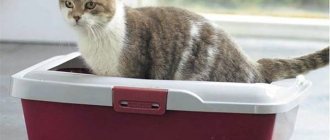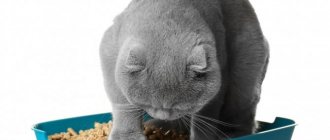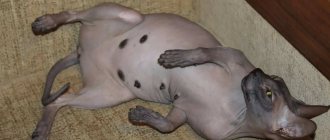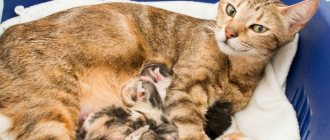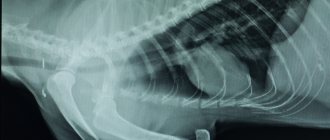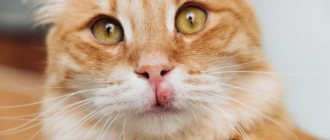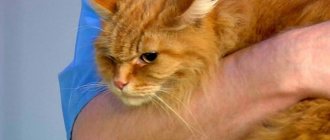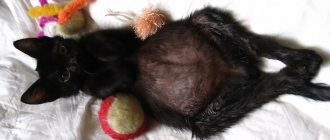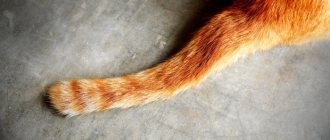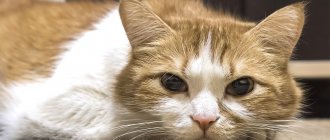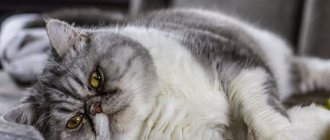Causes and treatment of diarrhea in a pregnant cat
Any illness in a pet expecting kittens should cause concern to the owner. When diarrhea appears in a pregnant cat, you need to pay special attention to this, since loose stools can lead to unpredictable consequences. Therefore, any owner should know what causes this condition, what to do if the cat has loose stools and what factors should cause concern.
The cat has diarrhea and vomiting
With a combination of symptoms such as diarrhea and vomiting in a cat, most likely the body is struggling with various negative influences of the external environment. Allergenic, irritating, poor quality food is cited as the cause. Another reason may be tumors, bacteria and traces of their activity, pancreatitis, kidney disease, abnormalities in the thyroid gland, intestinal obstruction.
If a cat is vomiting, it is likely that sunstroke or heatstroke could be added to everything. A pet vomits with diarrhea, most often as a result of feeding food from the owner’s table, which causes stool upset.
Causes of diarrhea
Pregnant cats are susceptible to various viruses and bacteria, which can lead to intestinal dysfunction. The most common causes of intestinal upset are:
- Food intolerance. Pregnancy is not the time to experiment with a new diet. Sometimes even familiar foods can give an unpredictable reaction from your pet. Most often, this reaction is observed to the following type of food: milk and dairy products, beef, horse meat, soy, fatty fish, chicken eggs. The body of an animal in an interesting situation often gives an allergic reaction to a previously well-tolerated food, which is manifested by diarrhea.
- Very often, a pet expecting a replenishment constantly feels hungry and, if you follow her lead, this can lead to the development of diarrhea. This occurs due to the fact that a large volume of food moves rapidly through the intestines and is not absorbed into the circulatory system. Thanks to this process, the feed enters the intestines in a liquefied state. This type of diarrhea occurs once. In this case, it is necessary to reduce the pet’s portion.
- If a cat is walking on the street, then she may well pick up something from a garbage container or eat a sick rodent.
- If a cat has not undergone a parasite removal procedure before mating, then worms can cause her to feel unwell. In this case, there is blood and mucus in the loose stool.
- If the pet was sick and was treated with medications, then drug resistance may occur; antibiotics often give such a reaction.
- In long-haired cats, a similar reaction can develop when hair gets into the digestive tract.
- If your pet has not been vaccinated against diseases such as enteritis or distemper, then pregnancy is the most susceptible time for the occurrence of infectious diseases. In this case, in addition to diarrhea, the animal develops fever and vomiting. If such symptoms are detected, you need to urgently contact a veterinarian, otherwise there is a risk of losing the cat and offspring.
- Stress can also cause loose stools; it is better to limit a pregnant cat from visiting guests or traveling on public transport.
- Another reason is hormonal changes in the body.
- If in the early stages the animal has loose stools, then this is a reason for an urgent visit to the veterinary clinic. Because there is a high risk of miscarriage.
Diarrhea 2 days before lambing is normal and should not cause concern to the owner. If your pet is calm and, in addition to loose stools, does not experience vomiting or fever, then there is no reason to worry. Soon we can expect the replenishment of the long-awaited offspring.
Some cat breeds, such as Devon Rex or Sphynx, react most acutely to any change in diet by producing loose stools.
Causes of diarrhea in a kitten
Loose stools in a kitten can occur for various reasons.
The most common one is mistakes when preparing a diet. Due to the immaturity of the digestive system, the pet’s stomach and intestines may react to a new or poor-quality product with vomiting or diarrhea. Severe diarrhea is accompanied by infectious diseases of viral or bacterial etiology, as well as helminthic infestations. Diarrhea often occurs due to foreign objects entering the digestive tract.
Poor nutrition
This is the most common cause of diarrhea in kittens from 1 to 5 months of age. The digestive system of young animals is very sensitive, so diarrhea often occurs due to errors in nutrition.
The disorder can be triggered by the following factors:
- change of diet, sudden transition to new food;
- consumption of low-quality or prohibited products;
- overeating – the kitten’s stomach cannot cope with a large amount of food.
Infectious and invasive diseases
In case of infectious diseases, kittens experience not only vomiting and diarrhea, but also other symptoms:
- depression, lethargy;
- discharge from the eyes;
- temperature increase;
- cough;
- wheezing;
- runny nose;
- loss of appetite or complete refusal to eat.
Diarrhea is accompanied by dangerous diseases such as salmonellosis and panleukopenia. The prognosis for the treatment of these diseases is unfavorable.
Salmonellosis
Diarrhea in a small kitten 1-2 months old, which is accompanied by mucous vomiting and fever, may indicate infection with salmonellosis. With this disease, kittens also have other symptoms - cough, purulent discharge from the nose and eyes, and bloody inclusions may be present in the stool.
In kittens, salmonellosis is often complicated by bronchopneumonia.
Plague
Diarrhea in kittens under 3 or 4 months of age may be a symptom of panleukopenia. This disease is caused by a virus that affects the bone marrow, small intestinal mucosa and lymphoid tissue. Feline distemper develops rapidly and occurs with an increase in temperature to 41 degrees, vomiting, profuse diarrhea and apathy.
About 50% of animals die within a few days of infection.
Worm infestations
Helminth infections are often accompanied by alternating diarrhea and constipation. Parasites that live in the intestines secrete toxins and injure its mucous membrane. Therefore, the animal experiences disturbances in the functioning of the digestive tract.
Diarrhea in a kitten may begin immediately after taking deworming tablets. This is how the intestines try to get rid of impurities.
Foreign body
Little kittens love to play with small objects - buttons, threads, Christmas tree rain and candy wrappers. If an animal ingests any of the above, vomiting and diarrhea are the most harmless things that can happen.
If a foreign object remains in the body, it can damage the walls of the small or large intestine as it moves through the digestive tract.
Other factors (allergy, stress, poisoning, vitamin deficiency)
The causes of severe diarrhea are not always associated with intestinal dysfunction. Diarrhea in a one-month-old kitten can even be caused by stress. If the bowel disorder began immediately after weaning from the mother or transferring the animal to a new owner, most likely it is associated with anxiety.
If a kitten has diarrhea, but there are no signs of an infectious disease, the animal did not overeat, the food did not change, it is worth taking into account other factors that could cause the disorder:
- allergy;
- avitaminosis;
- diseases of the gastrointestinal tract, for example, gastroenteritis;
- poisoning with toxic substances - household chemicals, plants;
- reaction to a vaccine or medication;
- change of teeth;
- benign or malignant neoplasms.
It is almost impossible to determine the exact cause of diarrhea without an examination.
Therefore, it is important to show the kitten to a doctor. The clinic will take tests, do an ultrasound, and, if necessary, an X-ray of the abdominal cavity
The veterinarian will compare the clinical picture and research data, make a diagnosis and prescribe treatment.
Treatment of a pregnant cat
Diarrhea in a pregnant cat should only be treated by a veterinarian, since loose stools can cause serious health problems not only for the expectant mother, but also for her offspring. The doctor must be warned that the pet is pregnant. To prevent the cat from having problems later, she must be prepared for a future pregnancy. To do this, you need to: first deworm the animal, treat it for fleas, feed it in accordance with the recommended diet developed for cats in an interesting situation. To prevent your cat from contracting infectious diseases during an important period of life, you need to get all vaccinations in advance.
A pregnant cat should not be given medications on its own; this can significantly worsen its condition.
If she has a mild case, you can try giving her water or water with dissolved glucose. When a pet refuses to drink, it should be fed through a syringe. You can try drinking it with powder from chicken stomachs. A good fixing effect is given by decoctions of pomegranate skins, oak bark, and chokeberry.
Diet food
If a pregnant cat is susceptible to diarrhea, then it is necessary to adhere to a special diet:
- Firstly, for the first time it is necessary to exclude dairy products.
- It is necessary to limit the consumption of foods containing large amounts of carbohydrates.
- The cat needs to be fed 4-5 times a day, in small portions containing a small amount of fat.
- You can include boiled eggs, rice, boiled white chicken, and chicken broth in your diet.
- You can give baby food that contains meat.
Clinical methods
Despite all of the above, the most effective treatment for diarrhea in a pregnant cat is in a well-equipped clinic. And even here there are difficulties. The fact is that many drugs simply cannot be given to pregnant animals. Therefore, they try to treat only the simplest cases with medication.
When you urgently need to stop diarrhea in a pregnant cat, but at the same time not harm her future offspring, you can use astringents (in the simplest version - a decoction of oak bark). Often you have to force them in, but the effect is worth it.
Fortunately, diarrhea is often just a consequence of indigestion. Probiotics will help cope with this pathology . If the problem is much more serious (oncology, for example), there are only two ways: either wait for the birth (after all, a cat is not a person, it does not carry for nine months), or induce premature birth, and only then treat the pet “seriously.” The second option is also suitable in cases where the cat has high breeding value. But still, a veterinarian should know what to do with a pregnant cat suffering from diarrhea!
source
Rules of conduct for the first day of illness
If your pet has loose stools, you need to provide her with proper first aid and seek help from a veterinarian. The salvation of the expectant mother and her babies depends on how quickly they seek help from a veterinarian. Basic rules of behavior on the first day of illness:
- The cat needs to be put on a starvation diet.
- The animal should always have clean water in the required volume.
- The animal needs to be given activated carbon at the rate of 1 tablet per 10 kg of weight. The tablets are pre-diluted in water and injected with a syringe, from which the needle has previously been removed, into the animal’s mouth. When consuming activated carbon, you need to increase your water intake and reduce the amount of food.
You need to treat a pregnant cat with great attention, and in case of problems with stool, before making decisions, you need to consult a veterinarian, only he will be able to competently help both the expectant mother and her offspring.
The cat will give birth soon, the cause of diarrhea before childbirth
Diarrhea in the last week before the onset of labor may begin due to the body’s preparation for the upcoming labor. And if the cat behaves calmly, you are sure that she could not have been poisoned by anything, then there is no reason to worry about the health of the animal. The body cleanses itself before the birth process, which can occur very soon.
If the birth is soon, a pregnant cat usually refuses to eat, she may have diarrhea. Before the birth begins, she begins preparing the nest; for this she can carry soft rags and things to a certain place. Therefore, it is better for the owners to think about this in advance and prepare a “maternity house” in the form of a box or plastic box. Cover the bottom of the box or drawer with an old sheet, show the future mother-cat the place of future birth and encourage her to stay in the prepared “house”.
If the case is not severe, the pregnant cat should be on a therapeutic diet. To do this, prepare a disposable syringe without a needle and try to give the cat a five percent glucose solution. Diarrhea in this situation can be treated with phthalazole. To do this, divide the tablet into eight parts and give the animal one part about four times a day. You can use the advice of traditional medicine. A decoction made from chokeberry, oak bark, pomegranate skins, and rice water fastens well.
But if diarrhea is frequent, the temperature rises, the animal becomes weak; for a cat, diarrhea in the last week of pregnancy is dangerous, as it can lead to miscarriages . What to do in this situation? The cause of the disease may vary. Immediately take the sick animal to a specialist to determine the diagnosis.
Early birth
Diarrhea in a cat before giving birth, especially a few days before the start of the process, may be evidence of the body’s preparation. The absence of other signs of possible poisoning or infection indicates the beginning of the labor process. Before the birth itself, the body begins to prepare and cleanse itself in advance.
Physiological diarrhea is due to the fact that two weeks before the onset of labor, kittens begin to move closer to the exit, the uterus stops putting so much pressure on internal organs located high up - the lungs, stomach. But the pressure of the grown uterus on the lower intestines, on the contrary, increases. Don’t worry if your cat has diarrhea several times without affecting its general well-being.
We suggest you read: Piroplasmosis in cats, symptoms and treatment of the disease
A rise in high temperatures, frequent diarrhea, and the appearance of increased weakness in a cat are extremely dangerous for a pregnant animal, often leading to premature birth and non-viable offspring if not treated in a timely manner.
Why a pregnant cat may have loose stools - 6 main reasons
If the owners observe diarrhea in a pregnant cat, then they should not hesitate to visit the veterinarian. It is urgent to show your pet to a veterinarian, since the consequences of such a pathological condition threaten not only deterioration of health, but even death of both the mother and her offspring. Rare cases of watery feces, in which the animal feels fine, eats and plays, is not a reason to panic, but it won’t hurt to review your pet’s diet. However, it is important for every breeder to know that even isolated cases of diarrhea in exceptional cases may indicate malignant tumors in the purring intestines.
Predisposing factors
A very common cause of “liquefied” feces in cats is a common eating disorder. This is especially true when the pet is fed... milk! Yes, yes, it is (in most cases) even harmful to cats, since the body of an adult animal, in principle, does not digest this product. Moreover, lactose intolerance is the “calling card” of almost all representatives of the cat family.
What happens when a cat drinks milk? Nothing good: since the animal’s digestive tract lacks the enzymes necessary to digest its components, the product begins to curdle. Soon the lumps of former milk begin to simply rot. When they enter the intestines, rich in microflora, from the stomach, the process accelerates several times. This doesn't lead to anything good.
In short, we would not recommend feeding a pregnant cat milk. Yes, it contains a lot of calcium, which is so necessary for future kittens, but the mother’s body still cannot absorb it. If there is such a need, it is better to compensate for its deficiency with the help of multivitamin preparations recommended by veterinarians. Of course, the list of all possible reasons is much longer:
- Food allergies and intolerance to some feed components.
- Parasitic and helminthic infestations .
- Malignant and benign tumors in the intestinal lumen.
- Viral, fungal or bacterial infections .
Separately, I would like to dwell on the quality of feed received by the animals. Believe me, the cat's body is very sensitive to poor nutrition! Never feed your pet stale food from the refrigerator. Such a diet will not only lead to diarrhea, but can subsequently cause, for example, cancer of the gastrointestinal tract.
If a pregnant cat has diarrhea in the later stages (or in the early stages, which is even worse) regularly, you need to consult a veterinarian, since this no longer looks like a normal digestive disorder.
Viral infections
Cats are susceptible to many viral infections. And almost all of them are accompanied by the development, including severe diarrhea.
The most common pathologies are:
- Feline panleukopenia (also called feline distemper).
- Leukemia (FeLV).
- Feline immunodeficiency virus (FIV).
- Feline coronavirus.
- Infectious peritonitis (FIP).
Unlike bacterial infections, viral infections in animals develop very quickly; suddenly, the pet’s body temperature increases very quickly. Let's look at the “parasitic” causes of diarrhea in pregnant cats.
Bacterial infections
Most often, uncontrollable diarrhea in animals is caused by: salmonella, pathogenic strains of E. Coli (common Escherichia coli), clostridia and campylobacter. Many of these pathogens are most often diagnosed in young cats, as well as in animals with weakened immune systems (and this can happen during pregnancy). These pathogens cause severe diarrhea, the animal completely loses its appetite, the pet becomes apathetic, a fever is possible, and the cat vomits. If nothing is done, death is possible.
Main reasons
Settlement of parasites
Both at the beginning of pregnancy and at the last stage, a pregnant cat should not diarrhea. If the animal has frequent loose stools, then perhaps the cause is a helminthic infestation, and coccidia most often liquefy the feces. With this parasitic disease, the stool contains impurities of blood and mucus, and the general condition worsens significantly. The cause of diarrhea in a pregnant cat can be Giardia, the presence of which is determined by a change in the color of the feces. With giardiasis, the intestinal contents released through bowel movements have a yellow or greenish tint, and the cat feels intense pain in the abdomen, exhaustion develops, and vomiting appears. But most often, diarrhea occurs in purrs carrying kittens, into whose body cryptosporidium has entered.
Causes of diarrhea based on the presence of impurities in stool
In addition to color, the presence of certain types of impurities in stool can indicate the root causes of digestive disorders.
Diarrhea with mucus
Mucus in feces appears due to exfoliation of the intestinal mucosa under the influence of some negative factors of the internal environment. However, in practice there are other options:
Diarrhea with copious amounts of mucus often occurs after treating a cat with antiparasitic agents designed to combat parasitic intestinal worms. Mucus in this case is the semi-digested remains of parasites. Due to some peculiarities of biochemistry, they cannot be completely digested in the cat’s gastrointestinal tract, and therefore leave her body in such an unsightly form.
Also, mucus is a very typical consequence of poisoning. Toxins have an extremely negative effect on the mucous membranes of the intestines, as a result of which the cells “fall off” en masse from the base, being excreted from the body in the form of a mucous paste.
Finally, mucous diarrhea is an extremely typical manifestation of many viral diseases, as well as coccidiosis and giardiasis.
When should you contact a veterinarian?
If a pregnant cat has diarrhea without accompanying symptoms, the purring cat is in a great mood and she eats as usual, then there is no need to rush to take her to the veterinary clinic. But if the expectant mother cat is diarrhea and at the same time other deteriorations in her condition are noted, then she should be urgently shown to a veterinarian. Specifically, you need to visit a veterinarian if symptoms such as:
- fever;
- hoarse meowing when palpating the abdomen;
- the presence of blood in the stool;
- apathy;
- loss of body weight;
- specific smell of feces.
Return to contents
When to Call the Veterinarian
Treating a cat for diarrhea
As you probably already understood, quite serious pathologies can provoke diarrhea in a cat. In view of this, it will be better if you immediately begin to take measures when loose stools appear. As for bloody diarrhea with mucus and vomiting, its occurrence must be treated as responsibly as possible. As practice shows, the cause of its appearance can be either obstruction of the entire intestine, or severe inflammation of only the colon.
If blood has already appeared in the stool, this indicates that the mucous membranes of the gastrointestinal tract are so inflamed that they have begun to become covered with wounds. This means that without proper and, most importantly, immediate therapy, the animal will inevitably die. I would like to say right away that such pathologies must be treated under the strict supervision of a specialist. Therefore, it will be better if you take your pet to the veterinarian as soon as possible. This pathology is treated in several stages.
At first, the animal is given drugs that stop the bleeding. This could be, for example, Dicynon. It is given to the animal 2 times per knock, 0.5 - 1 ml at a time. In addition, the cat is given ordinary clean water along with the drug. As soon as the bleeding stops, you can move on to blocking inflammation and restoring the microflora. For these purposes, sick animals are prescribed Metronidazole (20 mg per kilogram of body).
The occurrence of diarrhea in a pregnant cat in the last stages of gestation can be observed for a number of reasons, among which chronic diseases that were not initially treated often appear. Against the backdrop of increased stress on the body due to pregnancy, the body begins to fail, and ailments such as:
- diabetes;
- inflammation of the intestine of an idiopathic nature;
- pancreatic insufficiency;
- increased production of thyroid hormones;
- irritation in the large intestine; diseases of the liver and kidney structures.
We suggest you read: How many days does a cat ask for a male cat and how often does estrus occur?
It is necessary to call a veterinarian at home or take your cat to the clinic if the following characteristic symptoms of pathological conditions occur:
- the occurrence of febrile phenomena;
- abdominal pain when palpating the abdomen;
- the presence of blood fractions and clots in the feces;
- indifference to what is happening around;
- sudden weight loss;
- signs of dehydration;
- refusal to eat for a long period;
- fetid odor of feces of a putrid nature.
What to do?
To help your pet, first of all you need to show it to a veterinarian, who will assess the condition of the sick animal and prescribe a therapeutic regimen. Scientific studies have proven that in order to normalize stool in a pregnant cat, you initially need to keep her on a fasting diet for about a day, but no more. Then gradually include rice and chicken in the diet and under no circumstances feed the animal with dairy products. You cannot do any manipulations with your pet on your own or make adjustments to the menu; all actions must be coordinated with a doctor.
Dehydration is considered a dangerous complication of severe diarrhea. To avoid this pathological condition, you should give your cat as much water as possible, and the drink should be fractional; lightly salted chicken broth will also be useful. To stop diarrhea in a pregnant cat and, most importantly, not harm her offspring, the purring cat is given a decoction of oak bark. It will be possible to completely solve the problem of frequent loose stools only after eliminating the main cause that provokes frequent bowel movements.
Treatment of diarrhea
It is most effective to treat a cat for diarrhea in a hospital veterinary clinic. But difficulties may arise here - many medications are contraindicated for pregnant cats. Based on the clinical practice of veterinarians, the main cause of stool disorder in a pregnant cat is a violation of the digestive processes.
For treatment, groups of medications related to probiotics are widely used, and it is also necessary to prevent diarrhea in cats. If serious complications are diagnosed, such as oncology or chronic diseases of organ systems, it is necessary to wait for delivery and begin treatment of the pathology.
In simple cases, diarrhea can be eliminated at home. To do this, you need to leave your pet on a short starvation diet. Its duration should not exceed 20 hours.
Care must be taken to ensure that your pet does not become dehydrated. The more frequent and serious the disorder, the more fluid is lost by the body. You can find out the onset of dehydration in a simple way - touch your gums with your finger. If they are sticky or even dry, you need to sound the alarm. The health status of pets must be taken seriously, especially if they are expecting offspring. Timely detection of pathological conditions will help save the cat and her kittens.
A pregnant cat has diarrhea, what to do at home, medications
Diarrhea in a cat is quite rare and signals that your cat’s health is not all right. Although, why would? After all, everyone knows about the aristocratic origin and rather fastidious nature of these beautiful creatures. But if your cat’s stool suddenly changes, keep an eye on his diet.
Stale food or intolerance to certain foods will cause a lot of trouble for you and your four-legged friend. An extra trip to the doctor won't hurt in any case. In some cases, diarrhea is a fairly serious signal, and if measures are not taken, dehydration may occur. Let's look at the reasons that cause diarrhea in cats.
Common causes of diarrhea in cats
One of the common causes of diarrhea is food. It is quite easy to identify; if there is a change in diet, then this is a completely understandable reaction of the body. Food waste that complicates the process of digesting food, canned cat food, or just nasty things picked up on the street can cause diarrhea. In kittens that are accustomed to their mother's milk, diarrhea occurs when they switch to normal food. Try to avoid various types of sausage and other harmful foods in your cat's diet; this can also cause diarrhea.
If, instead of solidly formed feces, you find mushy or watery discharge in the cat’s litter box, and the cat begins to go to the toilet more often, then try to identify the reason for such a sudden change in stool. If you like traveling long distances, then keep in mind that not all long-eared animals tolerate them well . Stress can also cause disruptions in the digestive system; as you can see, nothing human is alien to our pets. These are fairly common reasons and you should not worry too much if this happens. But what if this is a symptom? Let's try to figure out in what cases diarrhea can be diagnosed as a disease.
- The presence of worms (transmitted through mother's milk, causing inflammation of the intestines, which, in turn, leads to diarrhea).
- Disorders of the liver, biliary system and pancreas.
- Dysbacteriosis.
- Various infections (calcivirosis, toxoplasmosis).
- Allergic reaction (medicines that cause allergies).
- Side effects of drugs.
- Cancer diseases.
Symptoms of diarrhea in a cat
If a cat has eaten something stale or unusual, then diarrhea may be accompanied by frequent bowel movements, flatulence, and bloating. In the case of a disease, the number of symptoms can increase to a dozen.
Signs of pathological stool disorder
In addition to soft feces, loose stools in a cat are accompanied by the following symptoms:
- apathetic behavior;
- vomit;
- lack of appetite;
- weight loss due to long-term disorder;
- dangerous dehydration;
- impurities of blood, mucus, undigested pieces of food;
- temperature increase;
- hard belly
Properly selected treatment will help get rid of the pathology without a trace. However, a veterinarian will be able to formulate a complete picture of the disease after receiving information about the patient’s behavior over the past few days. During the examination, the specialist will check your body temperature, feel the abdominal area, and determine the degree of dehydration. Analyzes of discharge for the presence of parasites or impurities, as well as x-rays, will help diagnose the cause of the disease with the greatest accuracy.
Duration of diarrhea in a cat
The appearance and disappearance of symptoms of pathology can go unnoticed by the owner. In an isolated case of diarrhea in a cat, there is nothing to worry about, but prolonged distress becomes an alarming sign. Doctors talk about three forms of pathology:
- Acute type, which is accompanied by painful, frequent bowel movements. The malaise lasts for several days.
- Chronic form, lasting more than 7 days and causing severe exhaustion with dehydration.
- The intermittent type is periodic in nature. It sometimes returns within 1 month.
Diarrhea in a cat, which appears due to an incorrectly selected menu, goes away quickly after changing the diet. The functioning of the gastrointestinal tract is restored, and stool returns to normal. Therapeutic nutrition involves a diet with limited food and plenty of water. Diseases of another type require great attention from the veterinarian and the owner.
Some features of the disorder in kittens
In a kitten, diarrhea may begin suddenly, due to a weak gastrointestinal tract. Children are more susceptible to attacks from viruses and bacteria than adults, and also react more strongly to stale or too fatty foods.
A kitten that has just been weaned from its mother often has bowel movements. To prevent this from happening, it is better to take the kitten from the family where it was gradually transferred to solid food. A sharp separation from mother's milk can provoke a number of diseases - and not only gastrointestinal ones.
In some cases, loose stool in a kitten signals serious diseases for which it was not vaccinated yet - panleukopenia (distemper) or leptospirosis. Here, the chances of survival depend on the speed of treatment and the baby’s immune system.
Only a veterinarian can tell you how to treat diarrhea in a kitten, since any prescription of drugs must be strictly adjusted in dose and duration of use. The main task of the owner before prescribing therapy is to replenish the lack of fluid in the baby’s body.
Digestive problems in a pregnant or lactating female
The expectant mother is more susceptible to attacks from viruses or bacteria than other individuals. Any pathogenic microorganisms that enter the body of a pregnant female cause problems in the gastrointestinal tract. New foods can also cause intolerance and intestinal reactions. Such products include beef, horse meat, soybeans, fatty fish, chicken eggs, and high-calorie dairy products.
Often, even habitual food causes frequent bowel movements in a pregnant female. You should not feed an eternally hungry expectant mother with food from the master's table. Excessive amounts of food do not have time to be digested, leaving in the form of liquid feces. This pathology can provoke a miscarriage. However, the appearance of diarrhea a couple of days before giving birth is considered normal.
The factor that provokes diarrhea in a nursing female is most often milk. Its excessive consumption in its natural form is not very beneficial for the pet. Milk should be replaced with cottage cheese, fermented baked milk, kefir or unsweetened yogurt.
Another reason for weakened intestines can be hormonal changes in the body or postpartum stress. Due to feeding, the water-salt balance is disrupted.
Diagnosing the type of diarrhea
There are different types of diarrhea. Just like the color of the discharge, it indicates different reasons. Let's look at them:
- mucous diarrhea (caused by worms, or is a consequence of their removal from the body, special attention in this case should be given to a pregnant cat, otherwise there is a risk of transmitting the disease to kittens),
- diarrhea from drinking milk (one of the most common),
- bloody diarrhea (a sign of illness),
- yellow or orange diarrhea of a rich color (indicates that the cat has problems with digestion or liver),
- white diarrhea (not a good signal, you should check the presence of bile in the intestines, if it is absent, consult a doctor),
- diarrhea due to taking medications (allergic reactions to certain types of drugs),
- watery discharge (indicates the presence of fluid in the intestines, but most likely there is no damage to the mucous membrane),
- diarrhea accompanied by vomiting (if symptoms persist for a long period of time, you must visit the clinic),
- Frequent bowel movements indicate a disorder of the rectum,
- green color of feces (indicates poisoning by stale food and indicates the presence of a rotting process in the intestines).
Diarrhea can occur in both adults and kittens. But don't worry, the treatment methods are the same. If something happens, an experienced veterinarian will help you figure it out and point out all the nuances and features of treating a kitten.
No matter what, any reaction of the cat’s body may indicate different diseases, which is why each case requires a different approach to treatment . Let's try to understand the methods of treating each of the above episodes.
The cat has black diarrhea
The usual color of cat feces is brown or light brown. But liquid black stool called “melena” signals a problem in the body.
Dark stool in a cat has its own reasons:
- iron supplements have been added to food;
- The pet's menu contains a lot of raw meat or blood meal.
But black diarrhea in a cat without the inclusion of iron supplements in the diet should warn the owner of the danger. If, along with stool upset, the animal refuses to eat, vomits, or has an elevated body temperature, consult a doctor immediately!
Red-black diarrhea indicates bleeding in the gastrointestinal tract.
The list of diseases with such a symptom is long: this can include helminthic infestation, hemorrhagic gastroenteritis, gastritis, colitis, stomach tumor, intestinal tumor, stomach ulcer. If such diseases are suspected, home treatment is unacceptable.
When is specialist help needed?
Of course, you should not neglect the help of a specialist. But if there are no more cases of diarrhea, the cat returns to its normal diet, and the cat’s well-being does not cause you any concern - limit yourself to light treatment with herbs and activated carbon . If the animal’s condition worsens, diarrhea becomes more frequent, the cat refuses food and water, the disease is accompanied by frequent vomiting, or there is blood in the feces, contact a specialist immediately! These symptoms may indicate illness. And if appropriate measures are not taken in time, the consequences can be disastrous.
Treatment with drugs
The list of drugs that will provide first aid to adult animals and kittens with diarrhea should include Vetom for cats. You can also use drugs such as Smecta, Baktisubtil, Enterosgel and Bifidum. Don't mix them, let's separate them . “Smecta” should be used with caution, as not all kittens tolerate it well. But “Baktisubtil” is better in this regard (14 capsules diluted in water, 2 times a day). But if there is no choice, then buy Smecta for children, it is used in 14 sachets 2 times a day. Enterosgel is one of the most effective drugs listed; it helps remove toxins from the body.
In addition to all medications, kittens need to use a probiotic. The most common is “Bifidum” (5 doses in a bottle, give one per day) or “Bifidumbacterin”. Activated charcoal injected internally using a syringe without a needle will collect unwanted bacteria. Decoctions of St. John's wort and chamomile heal and have an astringent effect.
If you have worms, use special preparations. Itraconazole will help with fungal infections, but if the cat is pregnant, the use of the drug is not recommended. If your kitten's diarrhea continues for two to three days, contact a specialist. He will take the necessary tests, identify the causes and prescribe treatment. It is not recommended to draw hasty conclusions and engage in self-treatment for severe forms of the disease!
Treatment at home
Due to the fact that you do not always have the time, opportunity or finances to visit a clinic, you can carry out some therapeutic measures yourself at home. If diarrhea in kittens or adult animals is not accompanied by fever, refusal to eat or lethargy, then:
- limit your cat's intake of dairy products,
- provide the cat with the necessary amount of water (preferably boiled),
- try to exclude food for 24 hours (no need to be scared, this will only benefit the cat),
- exclude canned cat food (it is better to give boiled rice and boiled meat, in some cases - meat puree),
- If the condition has returned to normal, you can switch to normal mode.
Preventive measures
If you follow simple rules, you can completely avoid the problem of diarrhea in your cat. Why:
- check your cat for worms in a timely manner,
- try to vaccinate your cats on time and regularly,
- monitor the quality of the food you purchase and the cat’s reaction to it,
- keep your cat's bedding, bowl and litter box clean at all times,
- carry out regular disinfection,
- If possible, try to limit your cat's contact with stray cats.
Keep an eye on your cats' health and keep an eye on them. Avoid tedious travel or stressful conditions , and allow them to breathe fresh air. If necessary, give vitamins and brush the fur. Believe me, your furry four-legged friends will appreciate this and you won’t have to treat them.
